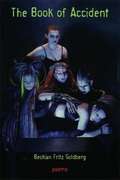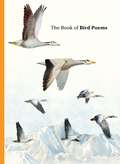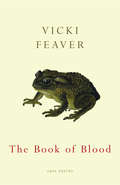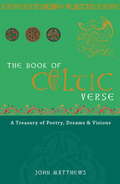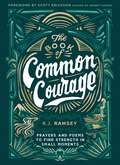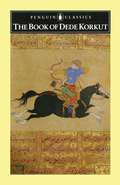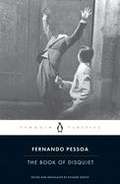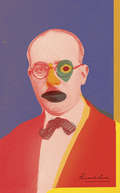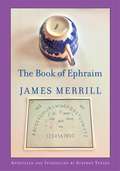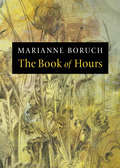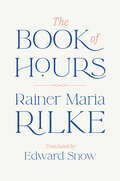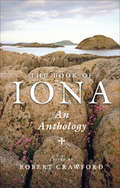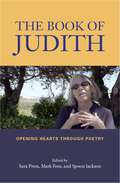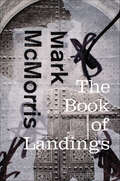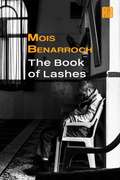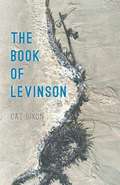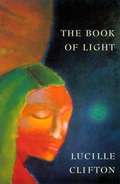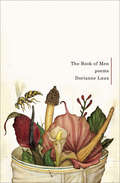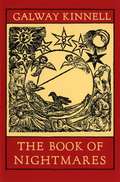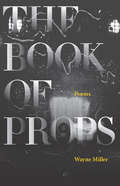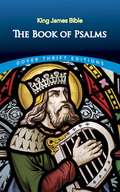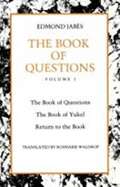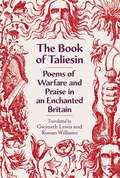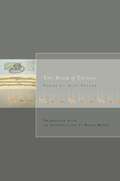- Table View
- List View
The Book of Accident
by Beckian Fritz GoldbergIn her latest collection of poems, The Book of Accident, Beckian Fritz Goldberg invites the reader into a shadowy atmosphere where her language prowls among strange images; hummingbirds become a fistful of violet amphetamines and desire gnaws away like a live rat sewed up inside us. Reading The Book of Accident is like entering a graphic novel with missing panels, a noir world of queasy glints and feral adolescents, a world where no one has to love you. Characters go by odd names: Torture Boy, Skin Girl, Lala Petite, Wolf Boy (his body pale as the plucked end of light). They are punk kids fending for themselves in an expressionistic version of those old stories that began, Let's take the children out to the woods / and leave them. And on every page, there's Goldberg's hard-edged wit, with the speed and flash of a video game. These poems show mercy but give no ground. They make you feel heartbroken and frightened and exhilarated at the same time.
The Book of Bird Poems
by Ana SampsonThe wonder of birds has charmed and inspired poets down the centuries and across the globe. From Shakespeare's 'feathr'd king' to Ted Hughes 'butterfly lightness', of swifts, this is a collection to stir the soul of any nature lover. Our emotional and cultural connection to the bird world is captured in 60 of the best-loved poems, which include the work of Percy Shelley, Edgar Allan Poe, Longfellow and Keats. All of them accompanied by the beautiful bird illustrations of Ryuto Miyake. From the common robin to the soaring eagle, from the chattering parrot to the sinister crow.This anthology will help us see our flighted cousins in a new light and confirm why they feature so much in our art, folklore and literature. They are indeed, poetry in motion.
The Book of Bird Poems
by Ana SampsonThe wonder of birds has charmed and inspired poets down the centuries and across the globe. From Shakespeare's 'feathr'd king' to Ted Hughes 'butterfly lightness', of swifts, this is a collection to stir the soul of any nature lover. Our emotional and cultural connection to the bird world is captured in 60 of the best-loved poems, which include the work of Percy Shelley, Edgar Allan Poe, Longfellow and Keats. All of them accompanied by the beautiful bird illustrations of Ryuto Miyake. From the common robin to the soaring eagle, from the chattering parrot to the sinister crow.This anthology will help us see our flighted cousins in a new light and confirm why they feature so much in our art, folklore and literature. They are indeed, poetry in motion.
The Book of Blood
by Vicki FeaverSplit between dark and light, this book records the dichotomy of human experience with unflinching force and clarity. It deals with break-up, depression, illness and death. But it also reveals an intense involvement with nature and a capacity for healing and love. There are intimate personal poems reflecting on relationships with people and creatures; poems which enter the lives of real and imaginary characters, Keats and Medea and Blodeuwedd, for example; and also poems which engage with paintings and political events.Set in a territory which connects child with adult, myth with reality, the personal with the universal, the book shows a poet fully open to the richness and possibilities of the world but also aware of its violence and pain, not as a remote observer but as someone who is a part of it.
The Book of Celtic Verse
by John MatthewsAn inspirational collection of Celtic Poetry compiled by the leading authority on the Celtic tradition.
The Book of Common Courage: Prayers and Poems to Find Strength in Small Moments
by K.J. RamseyThe Book of Common Courage is a collection of prayers, poems, and blessings to help you find a flicker of strength in the small and hard moments of life. Beloved author and therapist K. J. Ramsey invites you to journey word-by-word through Psalm 23 to experience how the Good Shepherd is with you and for you, especially in the valleys of life. When you struggle to find the words to hold your pain or trauma, be encouraged to cultivate the compassion and courage to believe that your story will, in fact, end in joy.Through K. J.'s lyrical and emotive writing, you are invited to:Surrender your anxiety and your tears to a faithful GodValidate your emotions and embrace them as the gift they areSlow down and remember that good will come againReplenish your soul with the life of Christ and the promises of GodRefresh your faith with a peace that lastsExperience newfound confidence in prayerRemember that even when pain is not past-tense, God is still present Courage is a common hope that we can cultivate together. These prayers and poems can be read in group settings--among friends, families, and worshipping communities--and are also ideal for personal reflection.Inside, you will find:Colorful still life and nature photographyPrayers, poems, and blessingsA ribbon marker This is a gorgeous gift to give for Easter, Christmas, birthdays, during a time of loss, during a life transition, or when looking for a new church community.
The Book of Dede Korkut
by Geoffrey LewisThe Book of Dede Korkut is a collection of twelve stories set in the heroic age of the Oghuz Turks, a nomadic tribe who had journeyed westwards through Central Asia from the ninth century onwards. The stories are peopled by characters as bizarre as they are unforgettable: Crazy Karchar, whose unpredictability requires an army of fleas to manage it; Kazan, who cheerfully pretends to necrophilia in order to escape from prison; the monster Goggle-eye; and the heroine Chichek, who shoots, races on horseback and wrestles her lover. Geoffrey Lewis's classic translation retains the odd and oddly appealing style of the stories, with their mixture of the colloquial, the poetic and the dignified, and magnificently conveys the way in which they bring to life a wild society and its inhabitants. This edition also includes an introduction, a map and explanatory notes.
The Book of Disquiet
by Fernando PessoaFernando Pessoa was many writers in one. He attributed his prolific writings to a wide range of alternate selves, each of which had a distinct biography, ideology, and horoscope. When he died in 1935, Pessoa left behind a trunk filled with unfinished and unpublished writings, among which were the remarkable pages that make up his posthumous masterpiece, The Book of Disquiet, an astonishing work that, in George Steiner's words, "gives to Lisbon the haunting spell of Joyce's Dublin or Kafka's Prague." Published for the first time some fifty years after his death, this unique collection of short, aphoristic paragraphs comprises the "autobiography" of Bernardo Soares, one of Pessoa's alternate selves. Part intimate diary, part prose poetry, part descriptive narrative, captivatingly translated by Richard Zenith, The Book of Disquiet is one of the greatest works of the twentieth century.
The Book of Disquiet: The Complete Edition (Five Star Fiction Ser.)
by Margaret Jull Costa Fernando Pessoa Jerónimo PizarroFor the first time—and in the best translation ever—the complete Book of Disquiet, a masterpiece beyond comparison The Book of Disquiet is the Portuguese modernist master Fernando Pessoa’s greatest literary achievement. An “autobiography” or “diary” containing exquisite melancholy observations, aphorisms, and ruminations, this classic work grapples with all the eternal questions. Now, for the first time the texts are presented chronologically, in a complete English edition by master translator Margaret Jull Costa. Most of the texts in The Book of Disquiet are written under the semi-heteronym Bernardo Soares, an assistant bookkeeper. This existential masterpiece was first published in Portuguese in 1982, forty-seven years after Pessoa’s death. A monumental literary event, this exciting, new, complete edition spans Fernando Pessoa’s entire writing life.
The Book of Ephraim: Including The Whole Of The Book Of Ephraim, Mirabell's Books Of Number, Scripts For The Pageant, And A New Coda, The Higher Keys
by James Merrill Stephen YenserFor the first time in a stand-alone edition, the acclaimed poet's classic poem about his communication with Ephraim, a guiding spirit in the Other World, is here introduced and annotated by poet and Merrill scholar Stephen Yenser."The Book of Ephraim," which first appeared as the final poem in James Merrill's Pulitzer-winning volume Divine Comedies (1976), tells the story of how he and his partner David Jackson (JM and DJ as they came to be known) embarked on their experiments with the Ouija board and how they conversed after a fashion with great writers and thinkers of the past, especially in regard to the state of the increasingly imperiled planet Earth. One of the most ambitious long poems in in English in the twentieth century, originally conceived as complete in itself, it was to become the first part of Merrill's epic The Changing Light at Sandover (1982), the multiple prize-winning volume still in print. Merrill's "supreme tribute to the web of the world and the convergence of means and meanings everywhere within it" is introduced and annotated by one of his literary executors, Stephen Yenser, in a volume that will gratify veteran readers and entice new ones.
The Book of Hours
by Marianne Boruch"Marianne Boruch's work has the wonderful, commanding power of true attention."-The Washington Post"[H]er patience, her willingness to wait for the film of familiarity to slip, allows her to see what is there with a jeweler's sense of facet and flaw."-Poetry magazineEndearingly strange, unsentimental, and uniquely structured, in true Rilkean fashion The Book of Hours questions the meaning and significance of everything from the flaws of human interaction to perfect posture. Unrelenting honesty and exacting description are coupled with the trials of a dying mother, saint shadows, birds, and "shit drying to chalk."My mother's body to wires, to tubesand their liquid, days she turned toward meor away, winter but so much sunfrom car to door. I followed it past nursesat their station talking movies, who's goodin one and not the other. Gown tiedat the back and neck, she slept besidea window. I wedged my chair there, reading,looking up, reading,-who knows whatI read-her legs bruised, thin, arms batteredby the doctor's needle. Her face. Can Isay this plainly now? There was lightas she grew less. She drifted to it.I'm not hungry, not religious, I'm in a spot,she told me one afternoon thenclosed her eyes to that radiance again.Marianne Boruch grew up in Chicago and earned a masters degree from the University of Massachusetts. She teaches at Purdue University and at Warren Wilson College. She lives in West Lafayette, Indiana.
The Book of Hours
by Rainer Maria RilkeA gorgeous new translation of one of the strongest inaugural works in twentieth century poetry. Long hailed as a masterwork of modern German literature, The Book of Hours (1905) marks the origin of Rainer Maria Rilke’s distinctive voice and vision—where clarity of diction meets unexpected imagery and first-person poetry discovers its full lyric possibility. In these audacious poems, a devout but candid speaker addresses an ultimately unknowable deity, passing through love, fear, guilt, anger, bewilderment, loneliness, tenderness, and exaltation in his search for meaning. In this dual-language edition, Edward Snow, “the most trustworthy and exhilarating of Rilke’s contemporary translators” (Michael Dirda, Washington Post), makes Rilke’s achievement accessible as never before in English. Snow retains a striking fidelity to the German text while also conveying the captivating psychological presence that animates Rilke’s best poems.
The Book of Iona: An Anthology
by Robert CrawfordWritings about the Scottish island from throughout history and today, from the likes of novelists, poets, playwrights, saints, queens, and more. This anthology is comprised of creative prose, nonfiction, and poetry that ranges from St. Columba to the present day, all linked by the isle of Iona. Featuring specially commissioned work by Meaghan Delahunt, Jennie Erdal, Sara Lodge, Victoria Mackenzie, Candia McWilliam, Ruth Thomas, and Alice Thompson, this wonderful collection will have broad historical and contemporary appeal. The Book of Iona is a celebration of one of Scotland&’s most beautiful islands and follows on from the success of The Book of St. Andrews.Praise for The Book of Iona&“A celebration of one of Scotland&’s most beautiful islands, this wonderful collection has broad historical and contemporary appeal.&” —Scottish Life Magazine&“Enthusiasts of Iona will appreciate the rich woven through the pages, whilst those who have never visited will be captivated and spirited away to a special land.&” —Life and Work&“The Book of Iona shows just what an anthology can achieve when approached with an open mind and imagination.&” —Gutter
The Book of Judith: Opening Hearts Through Poetry
by Sara Press, Mark Foss and Spoon JacksonAn homage to the life of poet, writer, and teaching artist Judith Tannenbaum and her impact on incarcerated and marginalized students.The Book of Judith honors Judith Tannenbaum but also reflects, through both form and content, on the complexities of seeing both the parts and the whole. The book presents different aspects of Judith—poet, teaching artist, friend, mentor, colleague—through a collection of original poetry, prose, essay, illustration, and fiction from 33 contributors. In so doing, it echoes her own determination to perceive contradiction without judgment. For the next generation of teaching artists in Corrections and elsewhere, the book serves as an inspiration on the qualities needed to survive and thrive in a multi-faceted, ever-changing environment.The book is divided into four sections, separated by riveting black and white pencil drawings inspired by the lives of those serving life in prison without possibility of parole. In Unfinished Conversations, contributors share their bond with Judith Tannenbaum through prose and excerpts from letters both real and imagined. In the second section, After December, poets reflect on the life, artistry, and legacy of Judith. The third section, Looking and Listening, focuses on the truth-seeking qualities that Judith brought to her work. The fourth section, Legacy, features work from winners of an award and a fellowship bestowed in her name.
The Book of Landings (Wesleyan Poetry Series)
by Mark McMorrisThe Book of Landings brings together the second and third parts of Mark McMorris's visionary trilogy "Auditions for Utopia,"—initiated in Entrepôt—and marks two stages in the evolution of the poet's conception of space. The first stage of the collection is the entrepôt, a space where disparate vectors of identity congregate, come into conflict, and finally merge into hybrid forms. The poetry follows a trajectory of diaspora, or exile, instigated by conquest, colonialism, wars, and political defeat in the search for Utopia. In The Book of Landings the promised dwelling has been removed from the realm of physical geography, and there is only transition—fragmentary episodes of arrival and departure, in transit from one entrepôt to another. These episodes of transit do not only compose a linear sequence only. Instead, they define a space or surface marked by repeated traversals over time—tracings and, importantly, re-tracings, by explorers, conquerors, migrants, merchants, slaves, refugees, and exiles—a city of palimpsests. An online reader's companion will be available at markmcmorris.site.wesleyan.edu.
The Book of Lashes
by Mois Benarroch Orna Taub"The Book of Lashes by Mois Benarroch is full of true poetry of the oldest genre of Hebrew poetry: Prophecy." Yitzhak Laor, Haaretz 11/29/2005 "The Israeli Bukowski." Yaron Avitov, Yediot Ajaronot, 1/11/2000 For the first time in English we get a full translation of the book "The Book of Lashes", a book that revolutionized modern Hebrew poetry in the 21st century and created a new movement of social and engaged poetry. Mois Benarroch is the winner of the most prestigious poetry prize in Israel, the Yehuda Amichai poetry prize, which was awarded to him in 2012.
The Book of Levinson
by Cat DixonThe family of Bob Levinson, a retired FBI agent, have been anxiously waiting for news, any news, about his fate since he vanished during a business trip to Iran in March 2007. These poems are based are on signs that Bob Levinson held up in photographs that were sent to his family in 2011.
The Book of Light: Poems
by Lucille CliftonTwice nominated for the Pulitzer Prize in poetry, Clifton extends her already formidable powers of revelation with these new poems. Her song springs almost spontaneously from her imagination to stitch surreality with concrete imagery drawn from temporal reality, revealing an essential mystery and wisdom from within.
The Book of Men: Poems
by Dorianne Laux"Laux writes gritty, tough, lyrical poems that depict the actual nature of life in the West today."--Philip Levine The narrative poems in Dorianne Laux's fifth collection charge through the summer of love, where Vietnam casts a long shadow, and into the present day, where she compassionately paints the smoky bars, graffiti, and addiction of urban life. Laux is "continually engaging and, at her best, luminous" (San Diego Union-Tribune). from "To Kiss Frank," make out with him a bit, this is what my friend would like to do oh these too many dead summers later, and as much as I want to stroll with her into the poet's hazy fancy all I can see is O'Hara's long gone lips fallen free of the bone, slumbering beneath the grainy soil.
The Book of Nightmares
by Galway KinnellGalway Kinnell's poetry has always been marked by richness of language, devotion to the things and creatures of the world, and an effort to transform every understanding into the universality of art.
The Book of Props
by Wayne MillerThe narrators in this mesmerizing collection often desire to hold time still - in moments of love, yes, but also when feeling fully located in a particular place or experience. Yet they also acknowledge that to hold time still would mean the death of love, the death of experience. Thus, the grounding and locating sensory images that surround us - and the eye that apprehends them - become greatly important. At the heart of the book is "What Night Says to the Empty Boat," a sequence of lyric poems in which the three main characters - Justine, Clarence, and Andy - drift to and from, together and apart, viewed through the dispassionate lens of the unspoken fourth main character. An artistic and philosophical endeavor to place oneself in the world, this stunning collection is a wholehearted embrace of being, where technique and subject come together in a remarkable combination of personal lyric and formal innovation.
The Book of Psalms: Large Print Edition (Dover Thrift Editions)
by King James BibleAmong the best known and most quoted books of the Old Testament, the Book of Psalms contains some 150 hymns of praise, prayers of crisis, and songs of faith once attributed solely to the Biblical King David. It is now believed that this collection of poems, originally chanted or sung with instrumental accompaniment, reflects Israel's entire history from the period of the exodus (13th century B.C.) to the postexilic restoration (after 600 B.C.), and we cherish them as the expressions of faith of many generations and many peoples. The Book of Psalms is shared by all sections of Judaism and Christianity, and is fundamental to both Christian and Jewish liturgies. Its English translation in the King James Version of the Bible (1611), from which this edition is reprinted complete and unabridged, is an exceptionally beautiful and stirring one, long regarded as a classic of English literature.
The Book of Questions: Book of Yukel, and Return to the Book (The Book of Questions #Vol. 1)
by Rosmarie Waldrop Edmond JabèsA meditative narrative of Jewish Experience and man's relation to the world. <p><p> The Book of Questions, of which volumes IV, V, VI are together published here, is a meditative narrative of Jewish Experience, and, more generally, man's relation to the world. In these volumes the word is personified in the woman Yaël, silence in her still-born child Elya. Even though words imply ambiguity and lies, they are the home of the exile. A book becomes the Book, fragments of the law that are in some way unified, where past and present, the visionary, and the common place, encounter each other. For Jabès every word is a question in the book of being. Man defines himself in the world against all that threatens his existence- death, the infinite, silence, that is, God, his primal opponent. How can one speak what cannot be spoken?
The Book of Taliesin: Poems of Warfare and Praise in an Enchanted Britain
by Rowan Williams Gwyneth LewisThe great work of Welsh literature, translated in full for the first time in over 100 years by two of its country's foremost poetsTennyson portrayed him, and wrote at least one poem under his name. Robert Graves was fascinated by what he saw as his work's connection to a lost world of deeply buried folkloric memory. He is a shapeshifter; a seer; a chronicler of battles fought, by sword and with magic, between the ancient kingdoms of the British Isles; a bridge between old Welsh mythologies and the new Christian theology; a 6th-century Brythonic bard; and a legendary collective project spanning the centuries up to The Book of Taliesin's compilation in 14th-century North Wales. He is, above all, no single 'he'.The figure of Taliesin is a mystery. But of the variety and quality of the poems written under his sign, of their power as exemplars of the force of ecstatic poetic imagination, and of the fascinating window they offer us onto a strange and visionary world, there can be no question. In the first volume to gather all of the poems from The Book of Taliesin since 1915, Gwyneth Lewis and Rowan Williams's accessible translation makes these outrageous, arrogant, stumbling and joyful poems available to a new generation of readers.
The Book of Things
by Brian Henry Ales StegerFrom his first book of poems, Chessboards of Hours (1995), Aleš Šteger has been one of Slovenia's most promising poets. The philosophical and lyrical sophistication of his poems, along with his work as a leading book editor and festival organizer, quickly spread Šteger's reputation beyond the borders of Slovenia. The Book of Things is Šteger's most widely praised book of poetry and his first American collection. The book consists of fifty poems that look at "things" (i.e. aspirin, chair, cork) which are transformed by Šteger's unique poetic alchemy.Translator Brian Henry is a distinguished poet, translator, editor, and critic.From Publisher's Weekly:Steger's efforts sometimes bring to mind such Western European figures as Francis Ponge and Craig Raine, who also sought to make household things look new and strange. Yet Steger brings a melancholy Central European sense of history- his objects tend to remember, or cause, great pain: "It pours, this poisonous, sweet force," Steger writes of "Saliva," "Between teeth, when you spit your own little genocide." (Nov.)From Guernica, a Magazine of Art and Politics:It is a rare treat to have an English translation before the ink has dried on the original. By which I mean, a mere five years after the book's Slovenian publication, Brian Henry has brought these poems to life for those of us not lucky enough to read Slovenian. Henry's translations are impressive for sheer acrobatics.
